'Something different in the air' as hushed Rome reckons with Pope's death
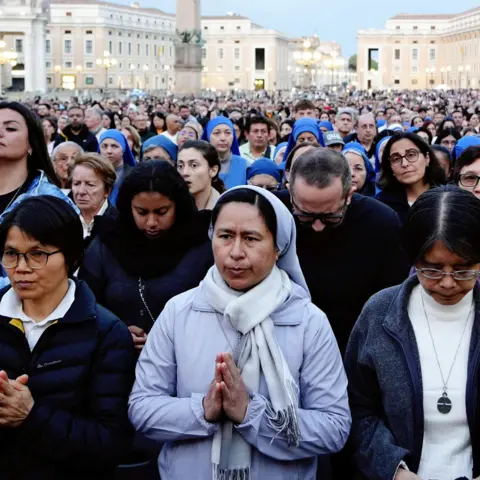 AP
APThe seat at the Vatican had been vacant for two days when a group of grey-clad nuns stood on St Peter's Square and started to sing.
Softly at first then louder, as if to encourage those who joined in timidly, the nuns broke into Ave Maria.
Every so often they shuffled a few inches forward, following the queue for Pope Francis's lying in state. And all the while they sang, their faces turned to St Peter's Basilica to their left, their white veils glistening under their large sun hats.
It was a fitting sight for an extraordinary week in which Rome seemed to regain its reputation as the "capital of the world" – and St Peter's Square as the centre of the Catholic universe.
There is mourning, but also recognition that the Pope, who lived to 88, died quickly and peacefully. "At least he didn't suffer," many say. Yet this isn't the time for celebration either - that will have to wait until after the funeral, when the conclave will spark the usual frenzy of excitement, intrigue and inevitable speculation.
Before then, in Rome these in-between days have taken on a flavour of their own.
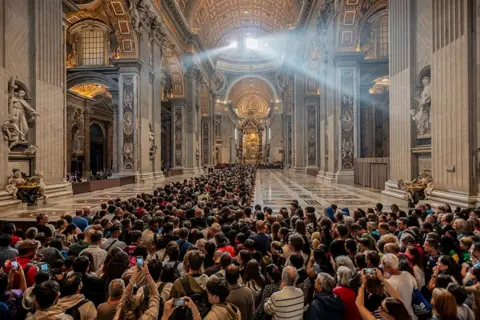 AP
APElena, a Romanian woman in her 50s, said she had noticed a "pensive" atmosphere in the city. "There are big crowds around but I have felt everything was a bit quieter, there is something different in the air," she told the BBC, guessing that the Pope's death was encouraging people to "look inside" more.
She added that everyone she spoke to this week – even non-believers – had been marked by his death somehow.
Her friend Lina agreed. She was standing behind the counter of her tobacconist shop in Borgo Pio, a quiet cobblestoned street lined with buildings in earthy tones and flower boxes near the Vatican. "It's neither a week of tragedy nor one of celebration," she said. "It's a chance for people to think, to reflect, and I think that's much needed."
Nearby, people slowly ambled down Via della Conciliazione – the pedestrian street that connects Italy and the Vatican city state, and the same one the Pope's coffin will travel down on Saturday as he reaches his final place of rest in the basilica of Santa Maria Maggiore.
The 4th Century church is only located around 4km away from St Peter's, but the journey there is set to take around two hours as the car carrying the Pope's coffin will move at walking pace to allow people lining the streets to see it and say their goodbyes, the Vatican said earlier this week.
Two plain-clothed police officers acknowledged that the neighbourhood was much busier than usual, but that it "felt like a Saturday," and that people had been very relaxed.
Security operation in full swing
Still, the signs of the huge security operation mounted by the Vatican and Italian authorities were everywhere.
On Wednesday, a soldier stood outside a religious goods shop brandishing a hefty bazooka-like anti-drone device. Asked whether the contraption could, for instance, disrupt drone frequencies and force them to return to their bases, he replied mysteriously: "Maybe, among other things."
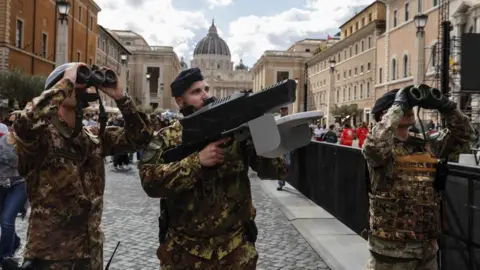 EPA
EPANext to him, a fellow soldier scanned the sky with binoculars. On the day of the funeral, they will be joined by thousands of security personnel from various branches of the police and armed forces, as well as river patrol units, bomb-sniffing dogs and rooftop snipers.
American student Caislyn, who was sat on a bench sketching the dome of St Peter's, said she was "shocked" at how safe she felt despite the number of people around.
The 21-year-old attributed that to the fact that "people are here to pay their respects to Francis, and to enjoy this beautiful city." She called the atmosphere "bittersweet," but said she saw the funeral as a "celebration of life".
"He gave such a great example to the world," she reminisced.
- You can watch and follow the funeral live here on the BBC News website and app. In the UK, there will be live coverage on BBC One from 0830-1230 BST, presented by Reeta Chakrabarti, available to watch on the iPlayer. There will also be live coverage on the BBC News channel presented by Maryam Moshiri. Finally, you can also follow coverage of the funeral on the BBC World Service
As Caislyn recalled Francis' commitment to the poorest of society, many others referenced his last-known trip outside the Vatican on Maundy Thursday, when he visited prisoners at the Regina Coeli jail, as he had done many times before.
'He never forgot where he was from'
"He was close to the people," Elena said fondly, adding that she understood why he "couldn't stay away" from helping those worst off.
"I work as a volunteer for homeless people and every time I try to stop, something pulls me back. Why? Because I lived like them for three months, because I come from poverty too. It's not hard for me to feel close to them," she said.
"And I think it was the same for Francis," she said, mentioning comments by Francis's sister Maria Elena who told Italian media last month that she and her siblings had grown up in poverty in Argentina.
Elena added: "He never forgot where he was from. Even when he got to the highest role, he never let it change him."
For Belgian tourist Dirk, whose wife was queuing to see the Pope lying in state in the basilica, the sombre atmosphere since the Pope's death is something that "draws people in, it's something they want to be a part of".
"It might just be temporary, it'll probably be over by Monday," he laughed.
- IN PICTURES: Symbolism on show as Pope lies in open coffin
- PROFILE: Acting head of the Vatican Cardinal Kevin Farrell
- EXPLAINER: A visual guide to Pope Francis's funeral
- WATCH: How previous Popes were laid to rest
- Are you in Rome for the Pope's funeral? Get in touch.
Dryly, he remarked on the number of homeless – and often disabled – people around the Vatican. "I saw a woman who was walking almost bent over, and people in clergy clothes completely ignored her, in fact they looked in the other direction so they wouldn't have to be confronted with it," he said.
"So it remains shocking, the wealth of these churches around us and the poverty of the people sleeping on their doorsteps." He shook his head. "The contrast is jarring to me."
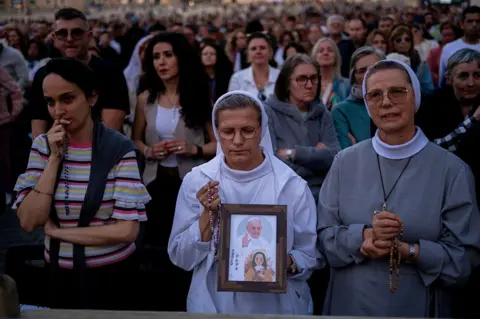 NurPhoto via Getty Images
NurPhoto via Getty ImagesKatleho - an upbeat young woman from Lesotho - told the BBC that she felt "special, happy" when she received Pope Francis's Easter blessing on the day before he died, when he appeared on St Peter's balcony. "I thought: I'm a real Catholic now!," she laughed.
She said she felt "so privileged to be joining a multitude of people" who were paying their respects to Pope Francis this week. "It's a real shared experience, it's so wonderful," she said, skipping off to catch up with the rest of her group.
For three days this week, tens of thousands of people streamed into St Peter's to bid their last farewell to the Argentinian Pope who – as he put it when he was elected – had come "from the end of the world".
As they entered the basilica after hours of queuing, visitors and pilgrims proceeded towards Francis's body, lying in a casket by the high altar built over the tomb of St Peter, the Catholic Church's first pope. Some brandished selfie sticks, others clutched their rosaries or their children's hands. All were very quiet.
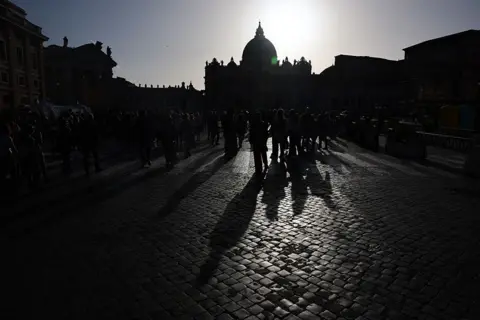 NurPhoto via Getty Images
NurPhoto via Getty ImagesOutside, under the warm April sunshine, groups of joyous African pilgrims in flashy head wraps ate gelato by the Bernini fountain, seagulls circling overhead.
Retired Californian couples fanned themselves under the square's colonnades, and journalists from around the world shouted questions in shaky Italian at any cardinal who looked like they may have a vote in the upcoming conclave.
Holding his phone out to show a caller back home his surroundings, a Brazilian priest spun on himself, laughing.
